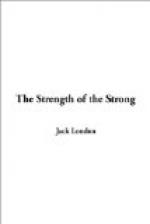“An’ thus ’ull be the loddie,” the skipper said, reaching out a hesitant hand to the child’s cheek.
But the boy drew away from him, sheltering against the mother’s side.
“Och!” she cried, “and he doesna know his own father.”
“Nor I hum. Heaven knows I could no a-picked hum out of a crowd, though he’ll be havin’ your nose I’m thunkun’.”
“An’ your own eyes, Donald. Look ut them. He’s your own father, laddie. Kiss hum like the little mon ye are.”
But the child drew closer to her, his expression of fear and distrust growing stronger, and when the father attempted to take him in his arms he threatened to cry.
The skipper straightened up, and to conceal the pang at his heart he drew out his watch and looked at it.
“Ut’s time to go, Annie,” he said. “Thot train ’ull be startun’.”
He was silent on the train at first, divided between watching the wife with the child going to sleep in her arms and looking out of the window at the tilled fields and green unforested hills vague and indistinct in the driving drizzle that had set in. They had the compartment to themselves. When the boy slept she laid him out on the seat and wrapped him warmly. And when the health of relatives and friends had been inquired after, and the gossip of Island McGill narrated, along with the weather and the price of land and crops, there was little left to talk about save themselves, and Captain MacElrath took up the tale brought home for the good wife from all his world’s-end wandering. But it was not a tale of marvels he told, nor of beautiful flower-lands nor mysterious Eastern cities.
“What like is Java?” she asked once.
“Full o’ fever. Half the crew down wuth ut an’ luttle work. Ut was quinine an’ quinine the whole blessed time. Each marnun’ ’twas quinine an’ gin for all hands on an empty stomach. An’ they who was no sick made ut out to be hovun’ ut bad uz the rest.”
Another time she asked about Newcastle.
“Coals an’ coal-dust—thot’s all. No a nice sutty. I lost two Chinks there, stokers the both of them. An’ the owners paid a fine tull the Government of a hundred pounds each for them. ’We regret tull note,’ they wrut me—I got the letter tull Oregon—’We regret tull note the loss o’ two Chinese members o’ yer crew ot Newcastle, an’ we recommend greater carefulness un the future.’ Greater carefulness! And I could no a-been more careful. The Chinks hod forty-five pounds each comun’ tull them in wages, an’ I was no a-thunkun’ they ’ud run.
“But thot’s their way—’we regret tull note,’ ‘we beg tull advise,’ ‘we recommend,’ ‘we canna understand’—an’ the like o’ thot. Domned cargo tank! An’ they would thunk I could drive her like a Lucania, an’ wi’out burnun’ coals. There was thot propeller. I was after them a guid while for ut. The old one was iron, thuck on the edges, an’ we couldna make our speed.




